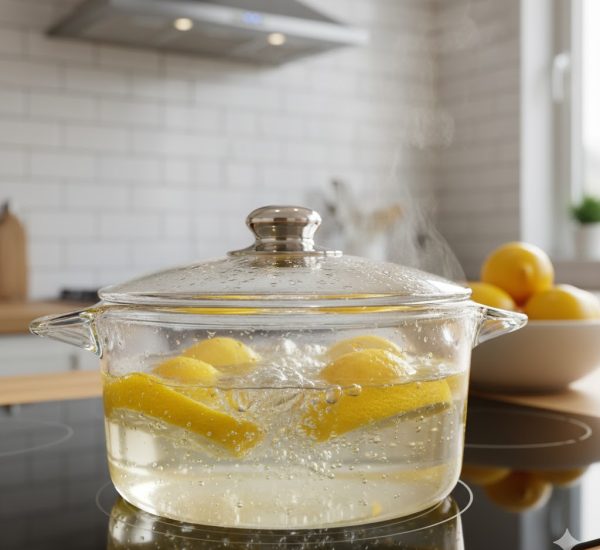Cooking is often a joyful and creative activity, but it can also bring some less pleasant challenges, particularly when it comes to odors. One of the most persistent and stubborn smells in the kitchen is the scent of eggs. Even after thorough washing, egg odors can linger on plates, cutlery, and in your dishwasher, making the kitchen environment unpleasant. Fortunately, there are effective and natural methods to completely remove these odors, leaving your dishes clean and fresh.
Why Egg Odors Persist
Eggs contain sulfur compounds that produce a strong, lingering smell, especially after cooking. This odor can cling to utensils, bowls, plates, and even glassware, remaining noticeable for hours or even days if not properly addressed. The problem is not limited to hand-washed dishes; even dishes washed in a dishwasher may retain some of the smell.
It is important to understand that a persistent egg odor does not necessarily indicate a malfunctioning dishwasher. The smell is simply very potent and resistant, which is why additional steps are often required to completely eliminate it. If left unattended, egg odor can spread to other kitchen items and make your cooking space unpleasant.
Immediate Measures After Cooking
The first step to prevent egg odor from lingering is to act quickly after cooking. One of the best practices is to rinse dishes and utensils immediately with cold water. This prevents the proteins in eggs from setting and reduces the intensity of the smell. Avoid using hot water at this stage, as it can sometimes cook any remaining egg residues, making odors harder to remove.
The Power of White Vinegar
A natural and highly effective solution for removing egg odors is white vinegar. This simple household ingredient is not only a staple in the kitchen for cooking and salads but also a remarkable cleaning agent. White vinegar has been used for generations for its antiseptic properties, deodorizing capabilities, and ability to cut through grease.
Its benefits in combating egg odor include:
-
Deodorizing: Neutralizes strong, persistent smells such as eggs, onion, and fish.
-
Antiseptic: Helps sanitize surfaces and utensils while removing odors.
-
Degreasing: Cuts through oily residues, ensuring a thorough clean.
White vinegar can be used in multiple ways, depending on the intensity of the odor and whether the problem lies with the dishes themselves or the dishwasher.
Removing Egg Odor from Dishes
If the odor is present on the dishes:
-
Place the dishes in the dishwasher as usual.
-
Pour a small amount of white vinegar directly onto the plates and utensils.
-
Run the dishwasher on a normal cycle, preferably with hot water, to help neutralize the smell.
The vinegar penetrates any lingering egg residues, eliminating the sulfur compounds responsible for the odor and leaving dishes fresh. For hand-washed dishes, you can soak them in a mixture of vinegar and water for 10–15 minutes before washing with regular dish soap. This ensures the odor is completely neutralized.
Eliminating Odor Inside the Dishwasher
Sometimes, the egg smell is not limited to dishes but originates from the dishwasher itself. Residual food particles, trapped moisture, or buildup in filters can cause persistent odors. In such cases, using vinegar directly in the appliance works wonders:
-
Place a cup or small bowl filled with white vinegar on the top rack of an empty dishwasher.
-
Run a complete wash cycle at the highest temperature.
-
The steam and vinegar will sanitize the interior, dissolve any buildup, and neutralize odors.
This method ensures that your dishwasher is not only odor-free but also hygienically clean, reducing the chances of future egg smells lingering on freshly washed dishes.
Additional Tips for Preventing Egg Odors
-
Rinse promptly: Always rinse dishes immediately after use to prevent proteins from setting.
-
Use vinegar regularly: Periodically run an empty dishwasher cycle with vinegar to maintain a clean, odor-free appliance.
-
Clean filters: Check and clean dishwasher filters regularly to remove trapped food particles.
-
Dry thoroughly: After washing, allow dishes to dry completely, as trapped moisture can intensify odors.
These preventive measures, combined with the vinegar cleaning method, create a comprehensive strategy for keeping both your dishes and dishwasher free from egg odor.
The Advantages of Using Vinegar
One of the main benefits of using white vinegar is that it is completely natural, inexpensive, and widely available. Unlike harsh chemical cleaners, vinegar is safe for all types of dishes, including glass, ceramics, and even some metals. It also leaves no lingering chemical smell, making it an ideal solution for households looking for eco-friendly and health-conscious cleaning methods.
Furthermore, vinegar is versatile. In addition to eliminating egg odors, it can also remove other unpleasant kitchen smells, such as fish or onion odors, as well as act as a general disinfectant for cutting boards, countertops, and sinks.
Conclusion
Persistent egg odors in your dishes or dishwasher can be frustrating, but with the right approach, they can be completely eliminated. Rinsing dishes immediately, using white vinegar in the dishwasher or for soaking, and maintaining a clean appliance are all effective steps to prevent and remove odors.
By following these simple methods, your dishes will come out fresh and odor-free every time, and your dishwasher will stay clean and efficient. Not only does this improve the kitchen environment, but it also saves time, reduces frustration, and ensures a hygienic space for cooking and dining.
White vinegar is a natural, cost-effective, and reliable ally in every kitchen, proving that even the most stubborn odors, like the smell of eggs, can be easily managed with a little care and the right techniques.



